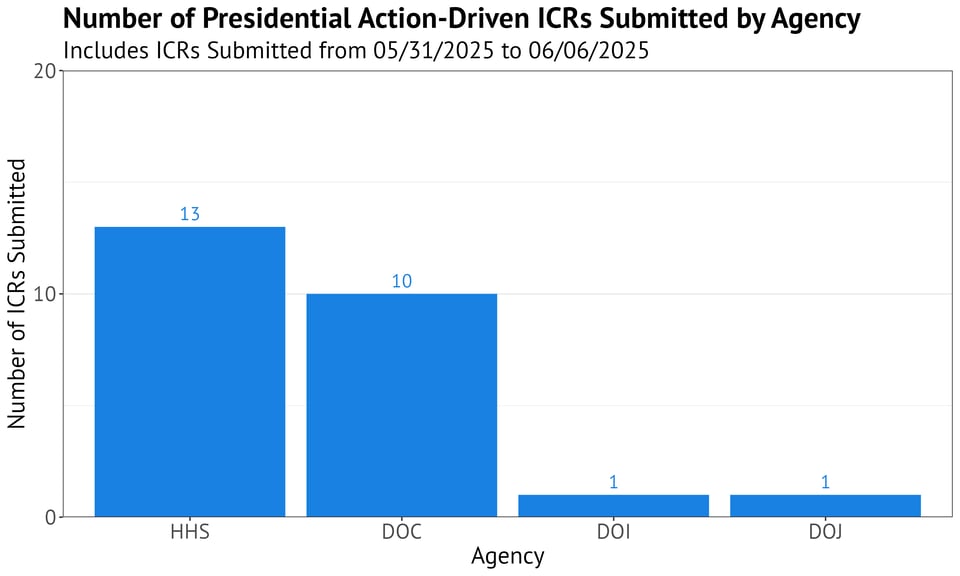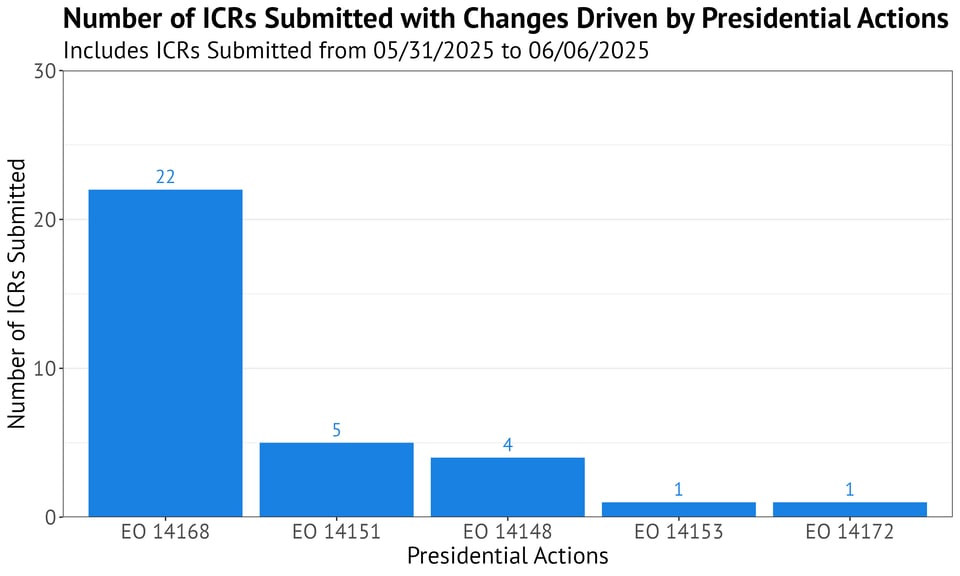by Melanie Klein
Since January 20, 2025, new Presidential Actions, such as Executive Orders and Proclamations, have required federal agencies to subtly adjust what information they gather and how they ask for it. This is especially true when it comes to language about gender and diversity, equity, and inclusion (DEI). Federal data collections leave a digital trail on RegInfo.gov as they evolve, but some footprints are easier to spot than others.
Tracking ICR Activity
Between May 31 and June 6, 2025, 66 Information Collection Requests (ICRs) were submitted. Of those, a total of 25 ICRs were submitted specifically in response to Presidential Actions.
Of the Presidential Action-driven ICRs submitted between May 31 and June 6, 2025, 88% requested a “no material or nonsubstantive change to a currently approved collection.” This means minor changes can be made without extending the collection’s expiration date. Because these revisions don’t trigger a public comment period or a notice in the Federal Register, they can easily fly under the radar and move through a fast approval process.
Between May 31 and June 6, 2025, the Department of Health and Human Services (HHS) stood at the forefront of these changes, having submitted 13 ICRs in response to Presidential Actions. The Department of Commerce (DOC) followed with 10 ICRs. Of HHS’s submissions, 9 came from the Administration for Children and Families (ACF), and all 10 of DOC’s submissions came from the National Oceanic and Atmospheric Administration (NOAA).

Presidential Actions Behind These Changes
Carefully reviewing each ICR from May 31 to June 6, 2025, allowed us to pinpoint exactly which Presidential Actions agencies used to justify their proposed changes:
22 ICRs driven by EO 14168: Defending Women from Gender Ideology Extremism and Restoring Biological Truth to the Federal Government, January 20, 2025
5 ICRs driven by EO 14151: Ending Radical and Wasteful Government DEI Programs and Preferencing, January 20, 2025
4 ICRs driven by EO 14148: Initial Recissions of Harmful Executive Orders and Actions, January 20, 2025
1 ICR driven by EO 14153: Unleashing Alaska’s Extraordinary Resource Potential, January 20, 2025
1 ICR driven by EO 14172: Restoring Names That Honor American Greatness, January 20, 2025

Notable Examples
To illustrate how Presidential Actions have shaped recent updates to data collections, here are 6 notable examples:
HHS eliminated equity language from maternal and child health programs
HHS’s Maternal and Child Health Bureau (MCHB) submitted a nonsubstantive change request on June 2, 2025, for the evaluation of the Pediatric Mental Health Care Access (PMHCA) and Screening and Treatment for Maternal Mental Health and Substance Use Disorders (MMHSUD) Programs. Citing EO 14151, the change memo outlined several terminology updates, including replacing “health equity” with “optimal access to behavioral health care,” replacing “social determinants of health” with “community health factors,” and simplifying “racial, ethnic, and geographic disparities” to “demographic factors.” Additionally, citing EO 14168, references to pregnant and postpartum “people” were changed to “women.”
NOAA updated survey to reflect the Gulf of America name change
NOAA submitted a nonsubstantive change request on June 3, 2025, regarding information collected about residents’ perceptions of offshore wind energy development in the Gulf of Mexico. The change memo noted that references to the “Gulf of Mexico” were updated to “Gulf of America” throughout the survey, in accordance with EO 14172. Additionally, citing EO 14168, NOAA removed two response options from a question about an individual’s sex: “Transgender, non-binary, or another gender” and “Prefer not to answer.”
ACF updated refugee survey question on sex-based discrimination
The ACF submitted a nonsubstantive change request on June 2, 2025, for the Annual Survey of Refugees. Citing EO 14168, the agency revised the survey questionnaire to ask: “Discrimination may happen when people are perceived as being different than others. Since coming to the U.S., have you experienced discrimination or been treated unfairly by others because of your ethnicity, race, skin color, culture, language or accent, sex, or religion in any of the following situations?” This replaced the previous question, which asked about gender rather than sex.
NOAA removed gender but advanced race and ethnicity data
NOAA submitted three nonsubstantive change requests, all of which revised information collected about gender and implemented the new race and ethnicity standards from Statistical Policy Directive No. 15 (SPD 15). The three affected information collections are a social study on the Pacific Coast groundfish fishery rationalization, a social network analysis on understanding the human response to water hazards, and programs for scholarships, fellowships, and internships. While these may not be among the most closely followed information collections, it is notable that revisions prompted by EO 14168 from the Trump Administration are being implemented alongside a statistical policy finalized during the Biden Administration.
BLM reverted to 1977 regulations for Alaska’s petroleum reserve
DOI’s Bureau of Land Management (BLM) submitted a revision request on June 3, 2025, for the Management and Protection of the National Petroleum Reserve in Alaska. EO 14153 directed the rescission of BLM’s final rule titled “Management and Protection of the National Petroleum Reserve in Alaska,” 89 Fed. Reg. 38712 (May 7, 2024), which had updated regulations in response to rapidly changing conditions, such as the impacts of climate change on the Reserve’s environment and Native communities. As detailed in the ICR’s supporting statement, BLM is now proposing to rescind the current regulations that ensure maximum protection of resource values in the Reserve’s Special Areas (SA) and revert to the 1977 version of the rule. This change affects one non-form information collection which is a list of criteria to be addressed when a member of the public recommends lands for a SA designation. BLM asserts that the criteria change, which includes providing USGS quadrangle maps, will increase efficiency and simplify an overly complex administrative process.
ACF RIFs may complicate its ability to meet statutory reporting deadlines
The ACF submitted a nonsubstantive change request on June 3, 2025, for the Low Income Home Energy Assistance Program (LIHEAP). Although the revisions are not requested in response to Presidential Actions, ACF explained that it will be unable to submit a full revision request or complete the 60-day comment period with a Federal Register notice before the current ICR expires on June 30, 2025. Because the program has a statutory requirement for grant recipients to submit the Carryover and Reallotment Report (CRR) by August 1, 2025, an interim solution was proposed in the change memo. It is suspected that the recent reduction in force and staff terminations within ACF and its Office of Community Services may have contributed to the agency’s difficulty in reinstating the ICR on time and meeting the statutory reporting deadline.
How to Stay Informed
Our ICR tracker at dataindex.us is updated daily with newly scraped data to surface these changes as they are proposed. We review every ICR on a weekly basis so you don’t have to, and our Tuesday blog posts highlight the latest developments. These quiet shifts in the federal data landscape may seem small, but they deserve our attention.
